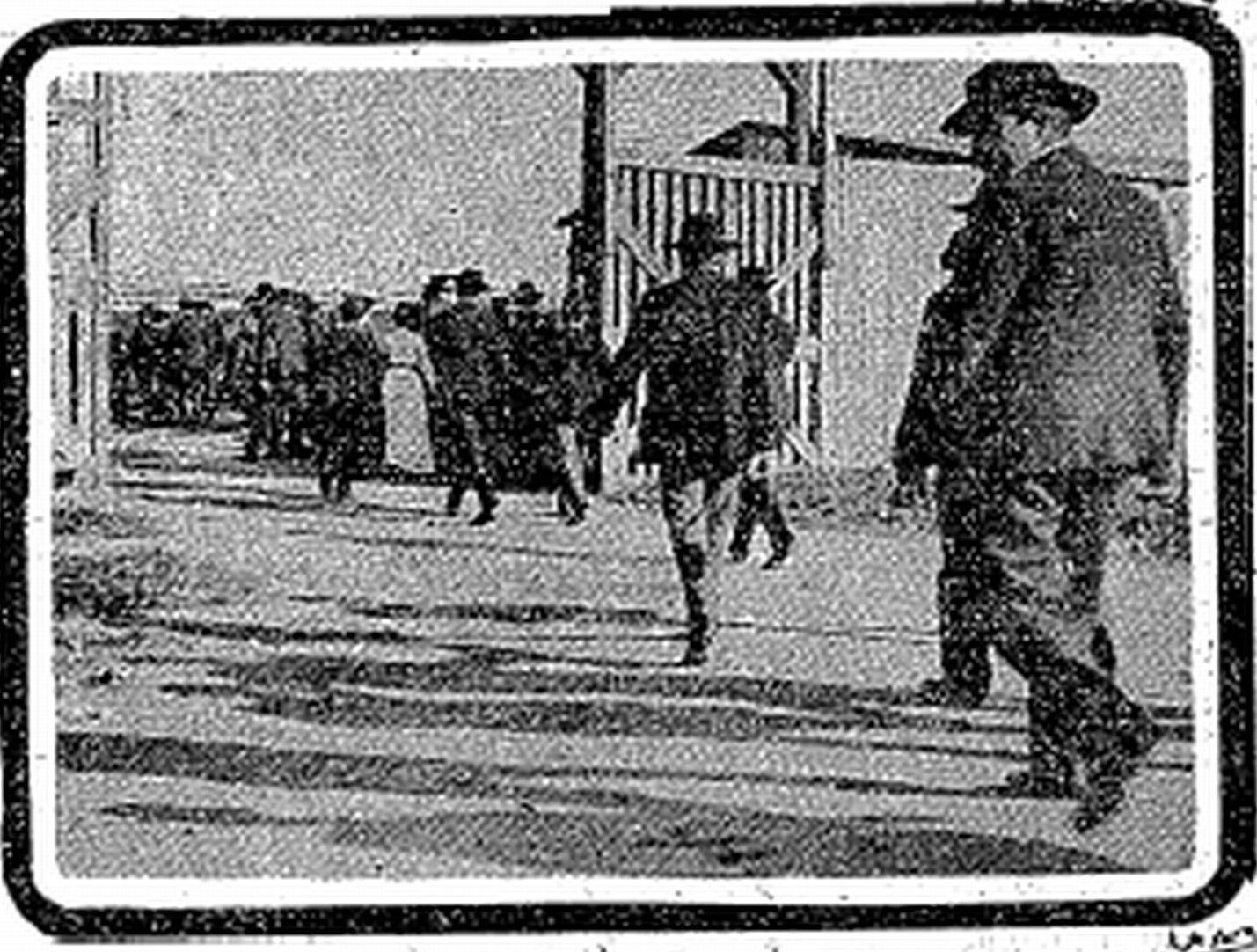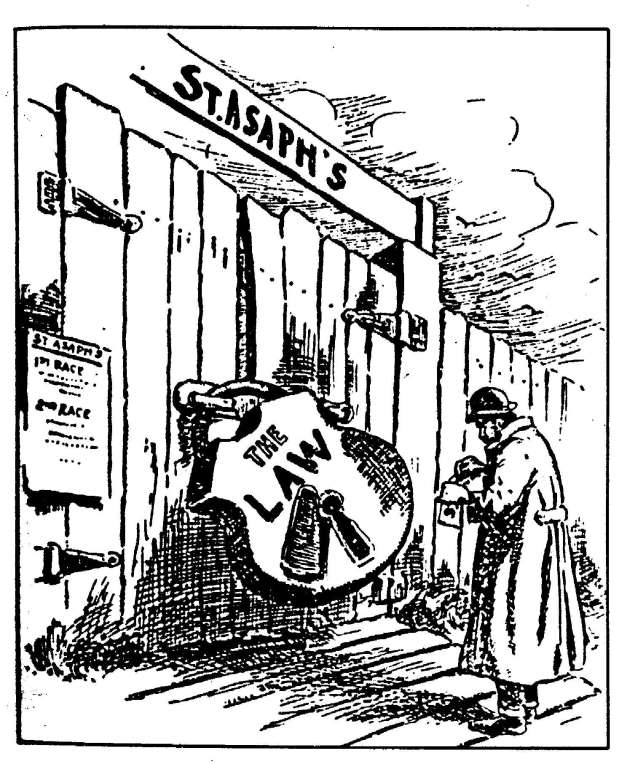The Infamous Pool Room
The Alexandria Gentlemen’s Driving Club battle against the Jockey Club in NY and the government in Richmond had little to do with horse racing per se. They were actually concerned with their gambling operations, which could only operate on a horse-racing track under the terms of the Mushback Law. A few races with second-rate horses provided the fig leaf needed to keep their main money stream running.
The national Jockey Club had a particular dislike for “foreign” betting, that is, betting on races at tracks other than the one right there. The Virginia Jockey Club traveled to New York in early April 1895 with charts and diagrams to show that because JM Hill had been so prolific in his creation and shuffling of shell companies that the building then occupied by the betting shop was technically not owned by the Virginia Jockey Club. The national Jockey Club was not persuaded and told Mushbach and Hill to either close the betting shop or become an outlaw track. Since the foreign betting was far more profitable, they chose the latter route. They continued to run second-class horses as a rogue organization to keep their Mushbach Law protection.
In early 1896, however, the legislature, under pressure from citizen’s leagues and preachers, reconsidered the Maupin bill and this time they passed it and the law-and-order governor O’Ferrall signed it that same night. The racetrack loophole of the Mushbach law was closed and gambling was illegal in the Commonwealth. The racing of horses ceased and the pool room moved into the more commodious former grandstand.
A Pool Room
A poolroom, in the parlance of the time, was a facility for placing (pooling) bets on races run at other tracks. The odds and results were sent to the poolroom by telegraph where betters could place their wagers in near real-time. The reliance on the telegraph made it vulnerable to chicanery, particularly if someone could intercept the messages en route to the poolroom, a source of continued concern to all such operators. The St. Asaph poolroom was managed by Lewis Burlingame, with this son Charles Burlingame as the telegraph operator. Blackboards were set up on the walls to post updated odds on the various races around the East coast and betting slips used to record wagers.
With the end of their legal loophole the pool room at St Asaph was clearly illegal. If Maupin and the governor thought this would end the problem they clearly underestimated JM Hill and his confederates.
Their first line of defense a clause in the Virginia constitution of the time gave the police of incorporated cities exclusive police powers out to one mile from the city limits. The pool room, although outside the city at the time, was just barely within a mile of the city line. Even though the county residents elected a crusading prosecuting attorney, it was a fairly simple matter for JM Hill to pay off the Alexandria mayor, police chief and other worthies to look the other way. After all, the betting shop was not in their city, next to their voters, why should they care?
Their second line of defense was, as could be expected of JM Hill, to incorporate two more companies. One was the West Virginia Athletic Association, incorporated in that state, which took and paid bets there, where it was legal. The second was the Old Dominion Telegraph Company, which
handled only communications between the pool room and the WVAA. The operation’s defense was that although they took money from and gave betting slips to gamblers, they were not themselves operating a betting shop – heavens no. They were simply a telegraph company conveying messages to a West Virginia company, and receiving messages directing them to pay certain individuals. Much like Western Union, they would argue. The actual betting, they said, was in West Virginia.

Patrons headed to the St Asaph poolroom
Crandall Mackey, the crusading new Commonwealth’s attorney for the country had been elected on a platform of shutting down the St Asaph pool room but was continually frustrated by interference by City officials and Hill’s maneuverings. In fact, the pool room remained spectacularly profitable, with Mackey estimating in 1904 that brought in $150,000 ($5 million in 2022 dollars) that year in profits, even after paying $14,400 per year for telegraph service and $12,000 a year in graft to local officials.
Nevertheless, Mackey launched numerous raids of his own, disrupting the operation and scaring off some of the customers, and got indictments against several of the pool room employees. In April 1904 he sent members of a grand jury to saunter into the pool room individually and
unannounced, where they discretely joined no fewer than 500 gamblers already there and, according to the Evening Star “They found the pool rooms in full blast. Business was rushing. The sheet writers, the board writers, the telegraph operators and other hands were on the move.” Three of the grand jurors even placed bets (two won and one broke even). This yielded arrest warrants against JM Hill, Frank Hill, Zora Hill and sixteen others, but they were all quickly released and their lawyers adopted a strategy of continual delay of any trials. The maneuvers dragged on, and in early January Mackey managed to get a conviction of the bartender for selling liquor. The drink-pourer was told to pay a $2,000 fine, far in excess of any money he had. This did not auger well for others and in January 1906 Mackey announced that he had reached an agreement with Hill and others to permanently close the St Asaph pool rooms.

It was the end of an era. The effects lingered, however. The travails of the county residents in getting the pool rooms shuttered in the face of opposition by a city in which they had no vote caused the local residents to explore other options. The grant of police power outside city jurisdictions did not apply to areas incorporated as municipalities. In 1907 the residents of Del Ray and St Elmo petitioned Richmond for incorporation as the Town of Potomac, and this was granted the next year, ending the jurisdiction of Alexandria city police and courts (at least until the 1930 annexation).